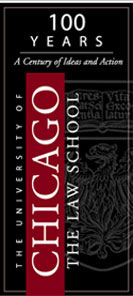|
Foreordained for Chicago
By
Richard A. Epstein
My first experiences at the University of Chicago long antedate
my joining the faculty 30 years ago. My older sister Alice had
spent two years in College at the University of Rochester before
she transferred to the University of Chicago. My younger sister
JoAnn spent one year at New York University before she transferred
here as well. I had therefore over a dozen years of continuous
exposure to the intellectual life at the University of Chicago
before I transferred here as a faculty member from the University
of Southern California Law School in the fall of 1972.
My period of constant engagement with the University has thus
carried over my entire adult life, and I continue to marvel at
how institutions develop certain personalities that seem to survive
a complete turnover of the individuals who populate them. Even
as a college student in the 1950s, I sensed the intense intellectual
pace that defined life at this University, and at this Law School,
which is so much a part of this University. People pushed, tested
and probed almost at will. Yet all of these exchanges took place
by an invisible set of legal rules that would have made the Marquis
of Queensbury proud. There are many low blows that can be inflicted
in argument, of which the most common is to appeal to rank and
position when reason starts to fail. Our house rules guarded against
that risk. Discussion at the University of Chicago follows, it
might be said, a form of the first possession rule. Those who
get the floor are allowed to keep it. The shy will have to remain
silent on the side lines. But keeping the floor is not simply
a matter of moving one’s jaw. You had to say something that
was worth hearing, or else you found yourself quieted under our
local version of the gong show.
Sounds harsh? Well consider that the flip side of this norm is
a complete disdain for the artificial pretensions rank and authority.
Contests in life can be scored, as it were, by bridge rules or
chess rules. In bridge master ratings are achieved by cumulative
points. One can therefore have a very high ranking even if well
past one’s prime. That does not happen in chess, where a
ranking reflects a current performance, not historical highs.
Chicago operates on chess rules on a daily basis. Young people
therefore enter into this formidable world knowing that they will
be judged by what they have to say, not by their age or their
credentials. This dominant cultural feature liberates debate by
creating, as we Chicagoans like to say, the right kind of incentive
structure. Senior faculty members are kept on their toes because
they know that rank has few if any privileges. Junior faculty
members get on their toes because they know that they can participate
from the get-go in the life of the community.
The resulting mix is not for all comers. People who visit Chicago
are often tempted to describe our distinctive norms as a laboratory
for Social Darwinism, red in tooth and claw. But in so doing,
they miss one of the key strengths of the Law School’s culture.
The sharp level of interchange, more often than not, leads to
an increased respect and cooperation across the faculty. It encourages
people to try out ideas that become the basis of their future
articles. It leads them to read each other’s work, and to
collaborate on joint projects in the great tradition of Walter
Blum and Harry Kalven’s work on Progressive Taxation. It
carries over to teaching by legitimating the Socratic method:
the students know that the faculty who fire questions from the
podium are often on the receiving end of spirited inquiry at lunch
and in workshops. And most of all this culture helps us young
as we get older. There is no mystery behind the extraordinary
productivity of the scholars at the University and the Law School.
Our social universe that values our contributions. We work in
an environment in which we have both strong support and face stiff
competition. The culture of the Law School will not allow us to
become complacent today, any more than it has allowed them to
be complacent when it first opened up its doors a century ago.
I was foreordained to spent my academic career here.
|



